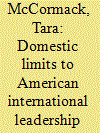| Srl | Item |
| 1 |
ID:
105356


|
|
|
|
|
| Publication |
2011.
|
| Summary/Abstract |
In this article it is argued that there is a striking absence from contemporary academic (and policy) discussions about American international leadership, and that is the domestic dimension to international leadership. Most current discussion focuses upon the actions of the Bush administration in the international sphere, which is argued to have eroded legitimate American leadership. It is hoped that Obama can reinvigorate American leadership through his actions in the international sphere. Here, however, it is argued that legitimate American leadership during the Cold War was based firstly upon a specific domestic political context in Europe. This specific domestic political context has steadily changed since the late 1960s, eroding legitimate American international leadership. In the absence of this domestic context, America will not be able to reassert legitimate leadership. International legitimacy, like charity, must begin at home in the domestic political sphere.
|
|
|
|
|
|
|
|
|
|
|
|
|
|
|
|
| 2 |
ID:
146318


|
|
|
|
|
| Summary/Abstract |
Recent British military interventions in Libya, Iraq and Syria have all been put to the vote in the House of Commons. This suggests a shift away from the longstanding Royal Prerogative on war-making powers towards an expectation that parliamentary authorisation is first required. As Tara McCormack argues however, there is a concurrent trend that undermines this apparent move towards greater democratic oversight of the use of military assets in conflict: the growing preference for ‘warfare by remote control’, such as the deployment of drones or military trainers. Perceived as a form of intervention with less ‘skin in the game’, such military action has so far been launched without prior parliamentary approval – and without scrutiny.
|
|
|
|
|
|
|
|
|
|
|
|
|
|
|
|
| 3 |
ID:
080936


|
|
|
|
|
| Publication |
2008.
|
| Summary/Abstract |
The concept of human security is arguably a progressive move away from the narrow conceptions of military and territorial security that have traditionally dominated international relations. The human security framework is argued to have the potential to empower and emancipate individuals by putting them at the centre of policy, analysis and debate and addressing the problems they face in their daily lives. In this paper I will argue that the human security framework cannot live up to its promises to empower the citizens of poor and developing countries. Whilst the human security framework problematizes the relationship between the state and its citizens, the framework replaces this relationship with relationships with other states or international agencies that lack accountability, effectively further disempowering citizens in weak or unstable states. The human security framework serves to reinforce international power inequalities and renders criteria for intervention by powerful states and international institutions less transparent and less accountable.
|
|
|
|
|
|
|
|
|
|
|
|
|
|
|
|